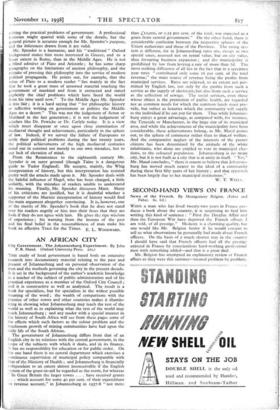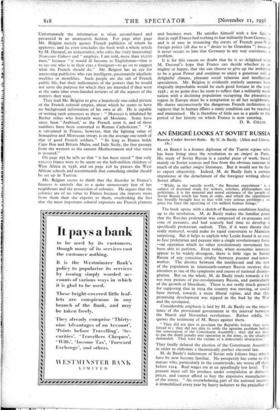SECOND-HAND VIEWS ON FRANCE
News of the French. By Montgomery Belgion. (Faber and Faber. 8s. 6d.)
WHEN a man who has lived twenty-two years in France pro- duces a book about the country, it is surprising to find him writing this kind of sentence : "First the Dreyfus Affair and then the European War have deprived the French officer, I am told, of all prestige." Modesty is a charming quality, but one would like Mr. Belgion better if he would consent to tell us what observations he personally had made about French officers. On the basis of a much shorter stay in the country I should have said that French officers had all the prestige enjoyed in France by conscientious hard-working professional men with something added—and that is a great deal.
Mr. Belgion has attempted an explanatory review of French affairs as they were this summer—treated problem by problem. Unfortunately the information is often second-hand and presented in an amateurish fashion. For page after page Mr. Belgion merely quotes French publicists of whom he approves, and he even concludes the book with a whole article by M. Detoeuf, an industrialist, who edits the (very interesting) Nouveaux Cahiers and "employs, I am told, more than 10,000 men," because "it would ill become as Englishman—that is to say one who is in their eyes a foreigner—to go on to suggest what the French should do." Mr. Belgion has an eye for interesting publicists who run intelligent, passionately idealistic weeklies or monthlies. Such people are the salt of French public life, but their indictments of the powers that be would not serve the purpose for which they are intended if they were at the same time even-handed reviews of all the aspects of the matters they treat.
They lead Mr. Belgion to give a hopelessly one-sided picture of the French colonial empire, about which he seems to have no background information of his own at all. He is capable of writing such sentences as these : "Morocco is inhabited by Berber tribes who formerly were all Moslems. Some have since been Arabised,' as the French term it, and of these numbers have been converted to Roman Catholicism." "It is calculated in France, however, that the fighting value of Senegalese and Moroccan troops is on the average one-tenth of that of good French soldiers." "So long as France holds Cape Bon and Britain Malta, and Italy Sicily, the free passage from the western to the eastern Mediterranean and vice versa is assured."
On page 193 he tells us that "it has been stated" that only 1.00,0DO francs were to be spent on the half-million children of West Africa in 1938, and on page 208 he praises the West African schools and recommends that something similar should be set up in Tunisia.
Mr. Belgion seems to think that the disorder in France's finances is entirely due to a quite unnecessary fear of her neighbours and the possession of colonies. He argues that the colonies are of no value to France because she imports more from them than she exports to them, overlooking the fact that the most important colonial exporters are French planters
and business men. He satisfies himself with a few figures that in 1938 France had nothing to fear inilitarily from Germany, and is at ease in trouncing the errors of French post-War foreign policy (all due to a "desire to be Grandma ") because it never occurs to him that Germany in any way constitutes a problem.
It is for this reason no doubt that he is so delighted with M. Detoeuf's hope that France can decide whether to be mighty or happy, that she can choose to give up the ambition to be a great Power and continue to enjoy a generous soil, a delightful climate, pleasant social relations and intellectual speculation. Mr. Belgion is evidently entirely unaware how tragically improbable would be such good fortune in the year 1938; at no point does he seem to reflect that a militarily weak nation with a declining population occupying the pleasantest region in Europe must be a temptation to all her neighbours. He shares unconsciously the dangerous French inclination to suppose that in human affairs a static condition can be reached and maintained. He is therefore of little use as a guide to the period of her history on which France is now entering.
D. R. Gil-LIE.











































 Previous page
Previous page